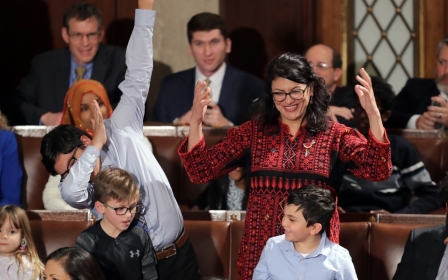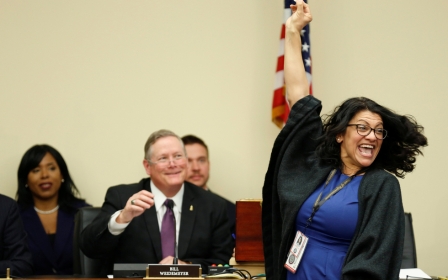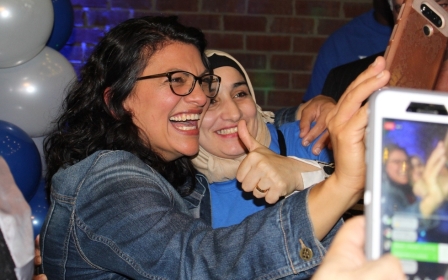Rashida Tlaib's rise comes in defiance of decades of attacks on Palestinians in US
WASHINGTON - In 2017, then-US ambassador to the UN Nikki Haley blocked the nomination of former Palestinian prime minister Salam Fayyad as a peace envoy to Libya simply because he is Palestinian.
Less than two years later, a Palestinian-American woman walked into the US Capitol building in Washington as a member of Congress, wearing a Palestinian thobe, a long-sleeved, ankle-length tunic.
With her left hand on the Quran and right hand pointing up towards the sky, Rashida Tlaib swore on Thursday to "defend the Constitution of the United States against all enemies" as she executes her duties as a member of the House of Representatives.
For the Palestinian community in the United States, whose identity has been demonised and associated with violence and extremism for decades, watching a Palestinian-American woman enter the halls of power in Washington was an uplifting experience - both politically and culturally.
"I am still Palestinian today," Tlaib told a group of supporters at a celebratory gathering a few blocks from Congress on Thursday evening only hours after she was sworn in.
I didn't change or try to run away from being Arabia, being a Muslima, being Palestinian
- Congresswoman Rashida Tlaib
She went on to urge young people with political aspirations to stay true to their roots, reminding the crowd that her family is from Beit Hanina, near Jerusalem.
Tlaib is only the second Palestinian-American to make it to Congress, after Justin Amash, a Republican, was elected in western Michigan in 2009.
"But it's also fair to say that she is a little bit more visibly Palestinian in the sense that her Palestinian identity is a more significant part of her public persona; that's a big part of how she publicly identifies herself," Omar Baddar, deputy director of the Arab American Institute, told MEE.
Indeed, Tlaib has repeatedly described herself as unapologetically Palestinian.
"Falasteen," as she often calls it, using the Arabic word for Palestine, has been a major component of who she is as a person and as a politician, she says.
On Thursday, Tlaib said her political mission has always been to take on the rich and powerful, to protect the environment, and to serve her constituents.
But she has never hidden who she is, she said.
"I didn't change or try to run away from being Arabia, being a Muslima, being Palestinian," she said, gendering the layers of her identity - Arab, Muslim, Palestinian - to mirror the grammar of the adjectives in Arabic.
The thobe
The congresswoman's traditional Palestinian dress, which she wore on her first day on the job, turned into an online campaign.
Hundreds of women across the world showed solidarity with Tlaib by posting photos of themselves on social media in the Palestinian gown, using the hashtag #tweetyourthobe.
"What she did yesterday by wearing her thobe was extremely powerful - not just because of the image of Rashida being in such an important place of power in the United States, but also in the way that it allowed Palestinian women all over the world to participate," Ahmad Abuznaid, director of the National Network of Arab American Communities (NAAC), told MEE on Friday.
The hashtag allowed for a display of pride for a nationality that has been viewed with scepticism by mainstream media outlets in the US, as well as politicians, for decades.
Haley perhaps best personified this animosity towards Palestinians in Donald Trump's administration.
The former ambassador has been hailed as a moderate and a presidential prospect, despite her remarks about Fayyad.
In fact, her comments were only one episode in a long history of prejudice against Palestinians in the US.
In May last year, after the Israeli army killed dozens of protesters in Gaza, the opinion editor at the Detroit News, a daily newspaper in Tlaib's hometown, described Palestinians as "a people that has adopted terror and bloodshed as a bargaining tactic".
Such media assaults on Palestinians often even go beyond the context of the Middle East conflict, as in the case of Palestinian-American professional football player Oday Aboushi, who faced unfounded accusations of extremism simply because of his nationality.
US popular culture has not been kind to Palestinians historically, either.
In 2008, Dunkin Donuts (now Dunkin) withdrew a TV commercial featuring celebrity chef Rachael Ray because she was draped in a Palestinian keffiyeh. The popular coffee-and-doughnut chain stressed that the chequered scarf did not intend to carry any political message.
A year later, popular comedy show Family Guy featured a "Palestinian alarm clock" that blurts out "Allahu Akbar" and explodes when it hits 7 o'clock.
The Rashida effect
Abuznaid said Arabs and Muslims in the US have generally been placed under an "orientalist trope" that portrays them as violent savages.
"However, with Palestinians in particular, we happen to be the bogeyman of the US's biggest ally and partner in the region," he said, referring to Israel. "That gives us an especially important spotlight."
Baddar, of AAI, echoed Abuznaid's comments, saying the Middle East conflict influences Americans' perception of Palestinians.
He said Israel has been depicted as a liberal democracy, like the US, that is fighting Palestinians who have been cast as "the other".
Still, the discourse in the US on Palestinians has been shifting in recent years, partly because of the rise of Palestinian-American public figures and elected officials, Baddar said.
"It's kind of a reminder that Palestinian-Americans, and Arab-Americans more broadly, are part and parcel of American society," he said.
In the case of Tlaib, Baddar stressed that she was not elected because she is Palestinian. While southeast Michigan is home to large Arab and Muslim communities, Tlaib's district is mostly African-American and white.
"She was elected because she made the most compelling case to her constituents that she was going to be the most effective person to fight on their behalf," Baddar said.
"This is a reminder that Palestinian-Americans are just as American as anybody else ... It's no longer that 'other' but simply a part of that diverse mix that makes the US what it is."
Stay informed with MEE's newsletters
Sign up to get the latest alerts, insights and analysis, starting with Turkey Unpacked
Middle East Eye delivers independent and unrivalled coverage and analysis of the Middle East, North Africa and beyond. To learn more about republishing this content and the associated fees, please fill out this form. More about MEE can be found here.




